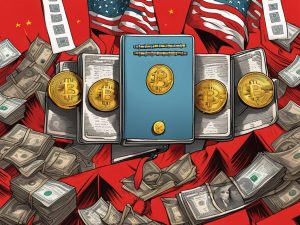🚀 Summary of Trump’s Victory and the Prediction Market Success
An anonymous trader reaped significant rewards from wagering on Donald Trump’s win in the 2024 Presidential election through a renowned prediction market platform. This trader achieved a remarkable profit of $11 million, stemming from strategic investments over time, culminating in a defining victory against Kamala Harris on November 6. As the prediction market matured, investors were able to cash in on their positions, firmly highlighting the evolving nature of political forecasting through trading.
💰 Big Wins from the Presidential Election Wager
The conclusion of the “Presidential Election Winner 2024” wager on the prediction market drew notable attention. After the market closed, participants holding “Yes” shares on Trump or “No” shares for his opponents collected their returns based on the difference between the final settlement price and their initial investment.
In a standout case, the official account of the prediction platform revealed the success of an anonymous trader who secured over $11 million in profit. This individual initially invested $18.02 million in shares at an average price of $0.61. The total return reached an impressive $19.43 million, showcasing the lucrative potential of such bets.
📈 Tracking the Presidential Election Bet Market
The journey began on January 5, when the prediction market opened the betting for the “Presidential Election Winner 2024.” At the outset, Trump’s shares held a 40.5% chance, valued at $0.405, while Kamala Harris’s shares started at only 3.5%. However, Joe Biden was viewed as a strong competitor at that time.
During this period, traders engaged significantly, with a staggering total of $3.28 billion wagered on the outcome. A noteworthy $1.33 billion of that amount was focused on Trump’s “Yes” and “No” shares, clearly reflecting the market’s keen interest in the outcome.
Trump’s shares generally remained between $0.40 and $0.60 for a major part of the betting period, with occasional peaks that reached up to $0.715 before final settlement.
🔍 Rising Influence of Prediction Markets
The surge in popularity of prediction markets during the election cycle has transformed political betting into a significant factor in forecasting electoral outcomes. Platforms that prioritize open and accessible information are redefining how data regarding elections is perceived and utilized.
Interestingly, analysts assert that prediction markets can serve as more reliable indicators than traditional polling, even when results differ. Notable figures, like Erik Voorhees, have publicly commended the unbiased and decentralized nature of prediction markets, advocating their role in delivering accurate forecasts.
Further emphasizing this point, Shayne Coplan, CEO of the platform, shared that the Trump campaign utilized the prediction market platform to assess their electoral standing, illustrating the value of these tools in modern campaigns.
“I just got word that the Trump campaign HQ literally found out they were winning from the prediction market. History was made today. Surreal.”
– Shayne Coplan
High-stakes betting tends to enhance prediction accuracy since traders have financial motivations to scrutinize trusted information while exploiting market discrepancies. Compared to centralized forecasting methods, this decentralized system encourages fact-checking and informed decision-making by knowledgeable traders.
This shift in how people perceive and utilize information may reshape access to political data in future elections, demonstrating the power of cryptocurrency transactions in facilitating these processes effectively.
🔥 Hot Take: The Future of Political Forecasting
This year marks a pivotal moment for prediction markets as they assert their relevance in political analysis and forecasting. The intersection of blockchain technology and market-driven insights provides a fresh perspective on electoral processes. As strategies and players evolve, it becomes vital to observe how these platforms can influence the political landscape, focusing on transparency and the democratization of information.





 By
By
 By
By
 By
By
 By
By

 By
By